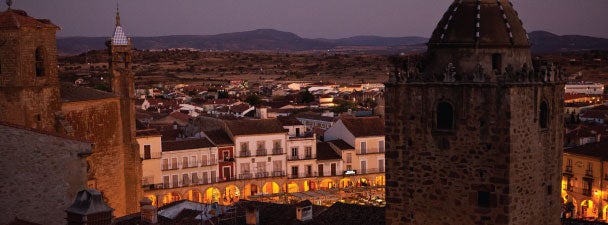 Here, food teaches lessons in culture, smiles illuminate a new perspective, songs offer a sense of humanity and streets provide a better understanding of the world. This is a magical place. This is Trujillo, Spain.
Here, food teaches lessons in culture, smiles illuminate a new perspective, songs offer a sense of humanity and streets provide a better understanding of the world. This is a magical place. This is Trujillo, Spain.
Photo essay by Leslie McKellar
The first of the morning light spreads across the pastures and footpaths of the countryside before seeping through, over and around the narrow corridors of the city’s Roman walls. The sky unfolds a deep, dry blue that broadcasts boldly across the Plaza Mayor and slopes slyly into the open-air piazzas. Francisco Pizarro’s shadow casts an outline of the city’s history, its proud heritage of conquistadores, with the shadows from the castle walls further defining that history with lessons in architecture, culture, the arts. And, when the sun is pulled across the sky, leaving it a reflective purple, the people light up the plaza with song, dance, tradition and smiles – until they finally, sleepily, leave the night to the glowing vigilance of La Virgen de la Victoria, the city’s patron saint.
This is a place where things are illuminated.
This is Trujillo: a living, thriving city of 10,000 that rivals the history, beauty, traditions and culture of our own prized city. Not that there’s any competition, really. When it comes to location, College of Charleston students will always come out ahead – especially if they take advantage of the College’s exclusive study-abroad program in Trujillo, Spain.
The Trujillo study-abroad program was founded in 1996 after James and Esther Ferguson donated one of their Trujillo homes to the College of Charleston Foundation. With College faculty staying in the Ferguson home, students staying with local host families and classes taught in La Coria – a 17th-century restored convent owned by the Fundación Xavier de Salas – this brilliant setting has continued to host the Department of Hispanic Studies’ study-abroad program every summer and every spring semester since that inaugural visit. Last year, a fall semester program was introduced for the first time for students from disciplines other than Hispanic studies.
Regardless of the program of study, however, Trujillo is always enlightening. And not just because of its rich history, its Roman baths or its Muslim architecture. Trujillo glows because of its people. It beams with their pride and generosity. And – when students wake, cook, eat, talk, laugh and share with their host families and friends – that’s what sheds light on everything else: the cultural nuances, the common sensibilities, the caring connections. Once that understanding is sparked, that’s when students really start to shine.
This is what Trujillo is all about. This is the power of place.
– Alicia Lutz ’98




